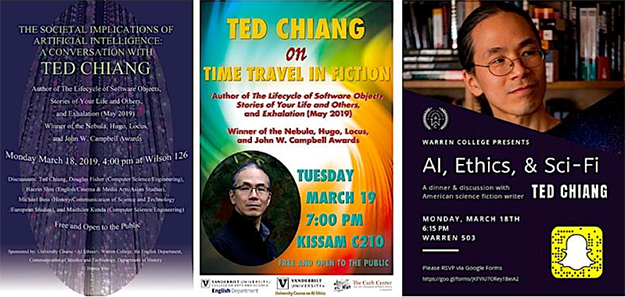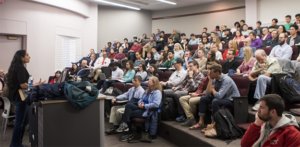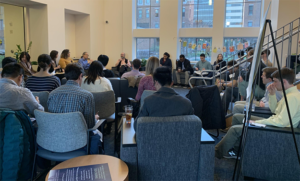Home » News » Esteemed Writer Ted Chiang visits Vanderbilt (Part 1)
Esteemed Writer Ted Chiang visits Vanderbilt (Part 1)
Posted by anderc8 on Monday, April 15, 2019 in News, The Ethics of Artificial Intelligence (AI).
Written by Haerin Shin and Douglas H. Fisher
With the generous support of Warren College, the English Department, the Curb Center, the History Department and the Communication of Science and Technology Program, our University Course on “The Ethics of Artificial Intelligence” organized and co-funded a special series of talks by the renowned literary science fiction writer Ted Chiang. As someone who straddles algorithmic culture and its aesthetic textures, Chiang personifies our interdisciplinary goals of embedding ethics and technical awareness in AI discourse.
Winner of four Nebula awards, four Hugo awards, the John W. Campbell Award for Best New Writer and four Locus awards (among many others), Chiang is one of the most prominent writers who instantiates “cognitive estrangement,” as Darko Suvin puts it – the function whereby (science) fiction defamiliarizes reality to reveal its social, cultural and historical disjunctures. Chiang’s works command a wide readership far beyond the science fiction fanbase. The philosophical depth, thematic originality and stylistic sophistication of his writings have been a source of inspiration for many. He explores a wide array of topics including the cosmology of time travel, chemically altered states of consciousness as a new mode of enhanced intelligence, an alternative approach to Christian mythology, free will and nonhuman consciousness, and ethical/legal/existential concerns about the evolving worlds of artificial intelligence and virtual reality.
With a bachelor’s degree in computer science from Brown University and as an alumnus of the Clarion Writers Workshop, Chiang offers a crystalline configuration of words that probe the depths of technicity, in what critic John Clute characterizes as a “tight-hewn and lucid style… [which] has a magnetic effect on the reader.” His short story “Story of Your Life” became the basis of the Academy Award winning film The Arrival (2016), and his novella “The Lifecycle of Software Objects” (2010) offers a rich and complex imaginary of artificial intelligence and its relational dynamics with humanity. Members of the AI Ethics course read the novella for AI & Law week along with his 2017 Buzzfeed article “Silicon Valley Is Turning Into Its Own Worst Fear,” which is widely referenced within and beyond the tech sector.

Ted Chiang visited Vanderbilt for three plenary events as well as classroom visits. Posters by Heena Yu (1, 2) and Mackenzie Moreno (3)
Kicking off the series of events, Chiang participated in a roundtable conversation with professors Michael Bess (History, Communication of Science & Technology) and Maithilee Kunda (Electrical Engineering & Computer Science), discussing “The Societal Implications of Artificial Intelligence.” The event drew a full house of students, faculty and staff from across campus along with members of the Nashville community.

Professor Maithilee Kunda speaks at the panel on Societal Implications of AI in Wilson 126 with Ted and Professor Michael Bess looking on
After a brief introduction, the panelists gave opening remarks. Each of them spoke to the prospects for artificial superintelligence, addressing the possibilities of an “intelligence explosion” – when AIs reach a certain level of intelligence, they will be able to improve themselves indefinitely by revising their designs. Even if such super AIs are “friendly” – a concept that Bess elaborates in an upcoming book – these AIs could still usurp human authority for “our own good.” Kunda noted how artificial intelligence is more of a “process” rather than a fixed entity to be ascribed individual agency, allowing for the possibility of evolutionary AI. Chiang argued that the “intelligence explosion” scenario is unrealistic. Analogizing our species’ inability to heighten IQ scores at will and suggesting that we substitute the term “AI” with “applied statistics” to strip away its mythical aura, Chiang asserted that the possibility of self-improvement is an unlikely development in the near future. In humans, he emphasized, improvements occur over a prolonged period of social effort; subtending the evolutionary framework to AI, Chiang maintained that isolated instances of AI systems would hardly be able to emulate humanity’s collective output. The panel discussion and audience Q&A that ensued expanded on the “intelligence explosion” – exploring interpretations of intelligence other than ‘IQ’ and the potential of a society of AIs (and humans) to speed up the evolution of superintelligence through social processes like that advocated by Chiang for humans, but currently in the realm of science fiction, as in the movie “Her,” for AIs.
The Q&A carried over to a post-dinner discussion with at least 40 students and other university constituents who signed up to take part in the feast. The discussion varied widely, to include his background and development as a writer, his satisfaction with The Arrival, other science fiction writers like Isaac Asimov, as well as AI. Chiang noted that he always envisions the “ending” of any given story before embarking upon the enterprise of actual composition.
In our next blog post we talk about the remainder of Ted’s visit, both to our University Course class on the Ethics of AI and another AI course, as well as his solo talk on Time Travel in Science Fiction.

